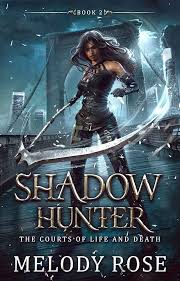Shadow Hunter: Offline Premium v60.125.2.0 MOD APK [Unlimited Money/Gems/God Mode]
Shadow Hunters, a captivating board game designed by Yasutaka Ikeda, has enthralled players since its debut in 2005 by Game Republic in Japan, with Z-Man Games bringing it to the United States in 2008. This social deduction game, steeped in a mysterious, anime-inspired world, pits players against each other in a battle of wits, alliances, and betrayal. With its blend of strategy, hidden roles, and dynamic gameplay, Shadow Hunters offers an immersive experience that appeals to both casual gamers and seasoned strategists. This article explores the game’s origins, mechanics, appeal, and cultural impact, highlighting why it remains a standout in the board game genre.

Origins and Theme
Shadow Hunters draws players into a supernatural conflict between three factions: Shadows, creatures of the night like vampires and werewolves; Hunters, humans tasked with eliminating supernatural beings; and Neutrals, civilians caught in the crossfire with unique objectives. The game’s anime and manga-inspired art style, featuring vibrant character designs, enhances its immersive atmosphere. First published in Japan, the game’s hidden role mechanic and survival theme resonated globally, leading to its Western release and a 2011 edition that included an expansion with ten new characters. Its roots in social deduction games like Werewolf make it a compelling choice for group gatherings, fostering intrigue and interaction.
Gameplay Mechanics
Shadow Hunters is designed for 4–8 players, with each game lasting about 30–60 minutes. Players begin by secretly receiving a character card that assigns them to one of the three factions: Shadows, Hunters, or Neutrals. Each character has a unique name, hit points (HP), special ability, and win condition. For example, Shadows aim to eliminate all Hunters, while Neutrals pursue individual goals, such as surviving or collecting equipment. The secrecy of hidden roles ensures players must deduce allies and enemies through gameplay and negotiation.
The game board features six area cards, like the Hermit’s Cabin or Underworld Gate, which players move to by rolling a four-sided and six-sided die, adding their totals. Each area triggers actions, such as drawing Hermit Cards to gain clues about others’ identities, or White and Black Cards for healing or dealing damage. Players may also attack others in the same area, rolling dice to deal damage equal to the difference between the rolls. A character dies when their HP is exceeded, revealing their identity, which can shift alliances. The game ends when a player or team meets their win condition, with multiple winners possible, even if a character is dead but their faction’s goal is achieved.
Why Shadow Hunters Captivates
The game’s appeal lies in its balance of strategy and luck. The dice-driven movement and combat introduce unpredictability, while deduction and bluffing allow players to outsmart opponents. Special abilities, like a Shadow healing after an attack or a Hunter delivering a one-time powerful strike, add depth, though Shadows often have reusable powers, giving them a slight edge. Neutrals bring variety, with goals ranging from surviving to triggering specific events, ensuring no two games are alike.
Shadow Hunters thrives on social deduction, encouraging players to observe actions, interpret Hermit Card responses, and negotiate. The gameplay fosters lively interaction, from accusing suspected Shadows to forming shaky alliances. Its accessibility—learnable in minutes—makes it ideal for newcomers, while its depth satisfies experienced players. The board game shines with larger groups (5–8 players), where the chaos of hidden identities creates memorable moments, like a Neutral unexpectedly winning by fulfilling a quirky objective.
Educational and Social Benefits
Beyond entertainment, Shadow Hunters hones critical thinking and deduction skills. Players analyze subtle cues, such as who avoids attacking whom, to uncover hidden roles. The game also fosters communication and negotiation, as players persuade others to trust or betray. For younger players, it teaches risk assessment and probability through dice rolls and strategic choices. In group settings, it promotes teamwork within factions and social bonding, making it a favorite for game nights and team-building events.
Cultural Impact and Community
Shadow Hunters has cultivated a dedicated fanbase, with players on platforms like BoardGameGeek and Reddit praising its replayability and social dynamics. Its anime aesthetic and supernatural theme resonate with fans of manga and fantasy, while its compact design makes it a staple at conventions. Online adaptations, like the multiplayer version at shadowhunters.live, have expanded its reach, allowing global players to engage in virtual battles. The game’s expansion, included in later editions, adds new characters and strategies, keeping the community engaged. Fans share custom cards and house rules, reflecting the game’s creative influence.

Despite its strengths, some players note drawbacks, such as the Shadows’ slight advantage or the occasional frustration of early elimination. The expansion is often recommended to balance characters and add variety. Still, its quick setup, fast-paced gameplay, and ability to accommodate large groups make it a standout.
Conclusion
Shadow Hunters is a masterclass in social deduction, blending strategy, luck, and interaction into a thrilling board game. Its hidden role mechanic, supernatural theme, and anime-in ЕСБ spired design create an immersive experience that keeps players guessing. Whether you’re a Shadow plotting in the dark, a Hunter seeking justice, or a Neutral chasing a personal goal, the game delivers tension and excitement in every turn. As it continues to inspire online adaptations and passionate communities, Shadow Hunters proves that a well-crafted board game can transcend time, uniting players in a battle of wits and survival.
